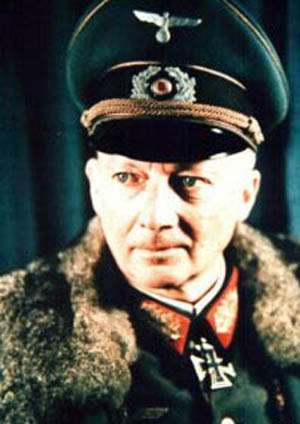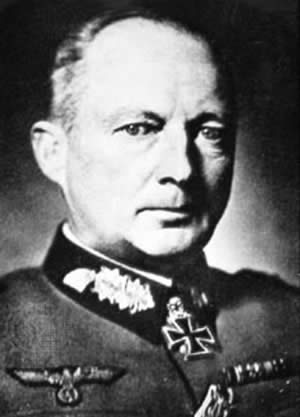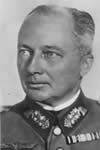Hans Günther von Kluge was born October 30, 1882 in Posen in western Prussia (today Poznan, Poland), the son of a Prussian lieutenant-general. On graduating from the Kriegsakademie, Von Kluge served as Leutnant on the general staff in Berlin from 1913 onwards.
During World War One Günther von Kluge served as staff officer. Serving in XXI Korps he was involved in the fighting on the eastern front (Carpathians) and on the western front in Flanders. In 1917 he was transferred to the Southern Army and subsequently to the Alpenkorps. He received various decorations. Shortly before the end of the war, when he was serving in the 236. Infanteriedivision, he was seriously injured.
After World War One, after having recuperated from his injuries, he was admitted to the Reichswehr. He was promoted to Oberst in 1930 and was in command of the 2. Artillerie Regiment. In 1933, Von Kluge became inspector of the Verfügungstruppen and rose to the rank of Generalmajor. After the seizure of power by the Nazis in 1934, Von Kluge was placed in command of the 6. Infanteriedivision and promoted again, this time to Generalleutnant. Ultimately, he was promoted to General der Artillerie in 1936 and commanded the 6. Armeegruppe.
At the official beginning of World War Two in September 1939, the German campaign against Poland, Von Kluge was in command of the newly established 4. Armee which was part of Heeresgruppe Nord. Among other things, 4. Armee was involved in the occupation of Danzig (today Gdansk, Poland) and during the final stages of the fighting in Poland, it also took part in the fierce fighting around Warsaw. For his achievements in the Polish campaign, Von Kluge was awarded the Ritterkreuz (Knight’s Cross).
After the successful conquest of Poland, Von Kluge’s 4. Armee was transferred to the west in preparation for the campaign against France and the Low Countries. The army was part of Heeresgruppe A commanded by Gerd von Rundstedt and was deployed in the region around Aachen. Fall Gelb was launched on May 10, 1940 and 4. Armee advanced through southern Belgium. Next, 4. Armee participated in the drive through northern France in cooperation with XV Korps commanded by Hermann Hoth. After having reached the Channel coast near Abbéville at the end of May, 4. Armee took part in the second phase of the campaign. The French 3rd Army group was engaged in battle, Amiens was captured and the army reached the river Seine. Subsequently, the ports of Dieppe, Le Havre, Cherbourg and ultimately Brest were overrun. On July 19, 1940, Von Kluge was promoted to Feldmarschall for his achievements in the west.
On June 22, 1941, Operation Barbarossa, the invasion of the Soviet Union was launched. Von Kluge and his 4. Armee were part of Heeresgruppe Mitte which was involved in the surrounding actions at Biyalistok and Minsk. Von Kluge was continuously at odds though with Heinz Guderian about the strategy to be followed. In Guderian’s view, motorized units should penetrate as far as possible in the German rear areas while Von Kluge was more conservative and only wanted to strike deeper after the infantry had disposed of all Soviet pockets of resistance. Yet, good progress was made and vast areas of western Russia were captured. After the battles at Smolensk and Vjazma, 4. Armee participated in the attack on Moscow – Operation Typhoon – in the winter of 1941. Moscow was not captured however and the Soviets unleashed a massive counter attack, driving the Germans out of the area west of Moscow.
The defeat near Moscow cost the Wehrmacht some 300,000 casualties. In addition, Hitler sacked quite a number of commanders involved such as Heinz Guderian, Wilhelm von Leeb and the commander of Heeresgruppe Mitte, Fedor von Bock. December 19, Von Kluge was appointed the new commander of Heeresgruppe Mitte.
In the spring of 1942, Von Kluge was forced to withdraw Heeresgruppe Mitte to the line Vyazma – Rzjev after having suffered heavy losses in fierce Soviet counter attacks. In the summer though, Von Kluge managed to stabilize the front there and in the following winter, Heeresgruppe Mitte was subjected again to massive enemy counter strikes. One of his commanders was General Walter Model who managed to prevent a second disaster like the one at Stalingrad in a brilliant way (the failed Russian campaign Operation Mars). For his achievements, Von Kluge was awarded the Eichenlaub (Oak Leaves) to his Ritterkreuz.
On October 12, 1943 Von Kluge had a narrow escape from death when he was involved in a road accident near Minsk. He was hospitalized in Germany for several months, having incurred severe injuries. Nonetheless, he was awarded the Schwerte (Swords) to his Ritterkreuz for his achievements on the Eastern front. Feldmarschall Ernst Busch succeeded him as commander of Heeresgruppe Mitte.
As early as 1943, Von Kluge had been sounded out by members of the military resistance about his possible support in a coup. Von Kluge did not go into this any further but he kept the existence of a military resistance movement to himself. Other prominent military men like Erwin Rommel could not persuade Von Kluge to take part in any form of resistance either. On July 2, 1944 Von Kluge was named Oberbefehlshaber West (commander-in-chief). The Allies meanwhile had established a strong bridgehead in Normandy and after a few exhausting battles they had managed to encircle large parts of the German army in Normandy in the Falaise pocket. The Allies enjoyed dominance in the skies over the battlefields and Von Kluge fell victim to it too. His staff car was attacked by British fighter bombers, inflicting severe damage. Von Kluge remained unscathed but his driver and another occupant were killed.
Von Kluge had not been informed in advance of the assassination attempt Oberst Claus Schenk Graf von Stauffenberg made on the Führer on July 20, 1944 (Assault 20-07-1944). Although Von Kluge had had nothing to do with the intended coup, he was relieved of all his functions on August 16 because a few days earlier, he had ignored an order by Hitler by ordering 7. Armee to attempt and break out of the Falaise pocket. Hitler appointed Walter Model the new ObWest and summoned Von Kluge to come to Germany to account for ignoring his orders. Von Kluge, knowing what fate awaited him, committed suicide near Metz in France on his way to Germany on August 19, 1944 by swallowing cyanide.
Definitielijst
- Armeegruppe
- Usually consisted of two or three neighbouring Armees, sometimes German and Axis-allied Armees. One Armee HQ, usually the German, temporarily became the commanding HQ of the other Armees. An Armeegruppe would always be subject to a Heeresgruppe. Later in the war the size of an Armeegruppe or Panzergruppe varied significantly. From 1943 onwards an Armeegruppe could be the size of an Armee or just the size of a corps.
- Führer
- German word for leader. During his reign of power Adolf Hitler was Führer of Nazi Germany.
- Heeresgruppe
- The largest German ground formation and was directly subordinate to the OKH. Mainly consisting of a number of “Armeen” with few directly subordinate other units. A Heeresgruppe operated in a large area and could number several 100,000 men.
- infantry
- Foot soldiers of a given army.
- invasion
- Armed incursion.
- Regiment
- Part of a division. A division divided into a number of regiments. In the army traditionally the name of the major organised unit of one type of weapon.
- Reichswehr
- German army during the Weimar republic.
- resistance
- Resistance against the enemy. Often also with armed resources.
- Soviet Union
- Soviet Russia, alternative name for the USSR.
- strategy
- Art of warfare, the way in which war should be conducted in general.
- Wehrmacht
- German armed military forces, divided in ground forces, air force and navy.
Images
Information
- Article by:
- Tom Notten
- Translated by:
- Arnold Palthe
- Published on:
- 19-04-2017
- Last edit on:
- 15-03-2024
- Feedback?
- Send it!
Sources
- Geschiedenis van de Tweede Wereldoorlog, Samengesteld door Sir Basill Lidell Hart
- Axis Biographical Research










